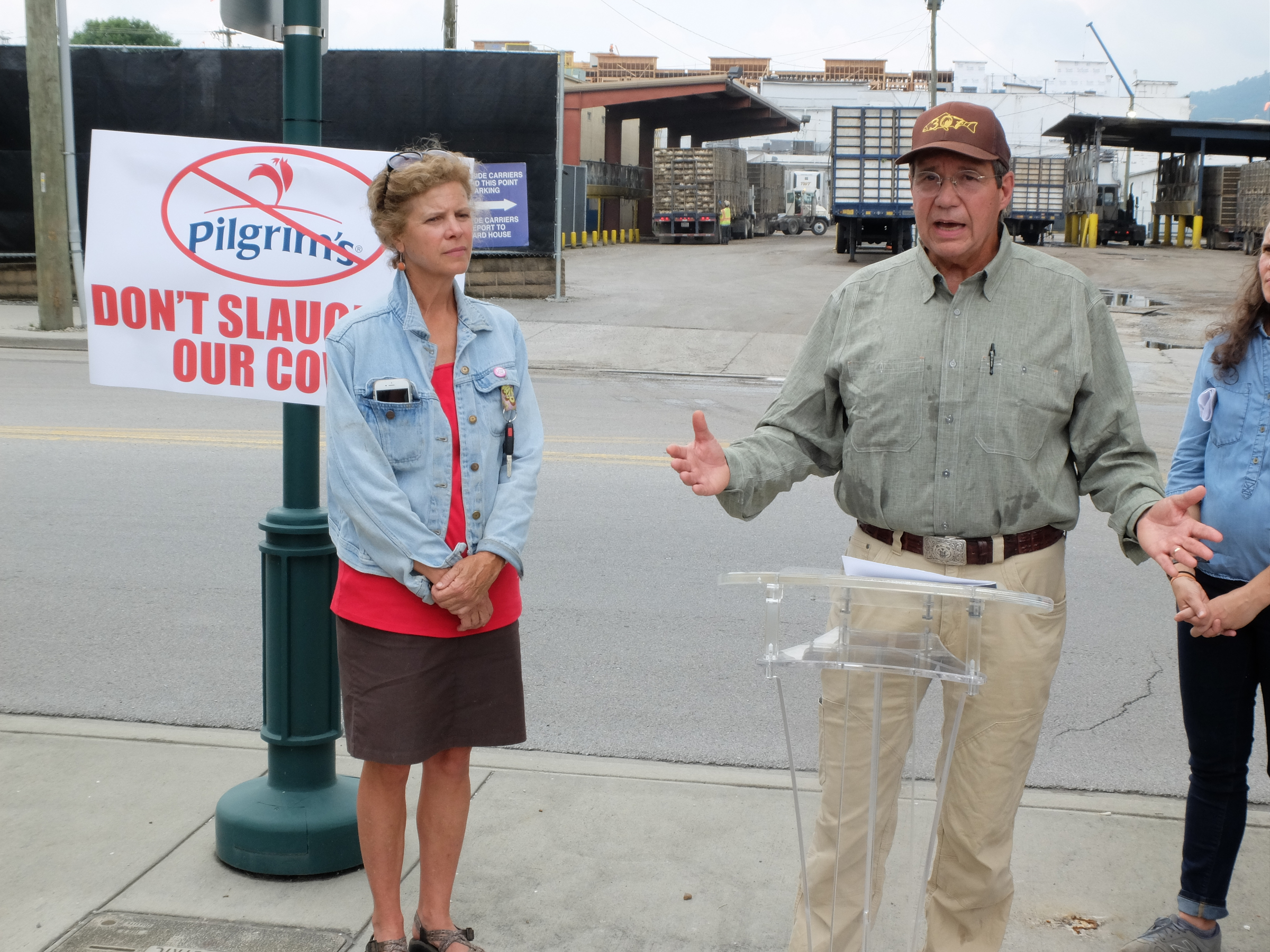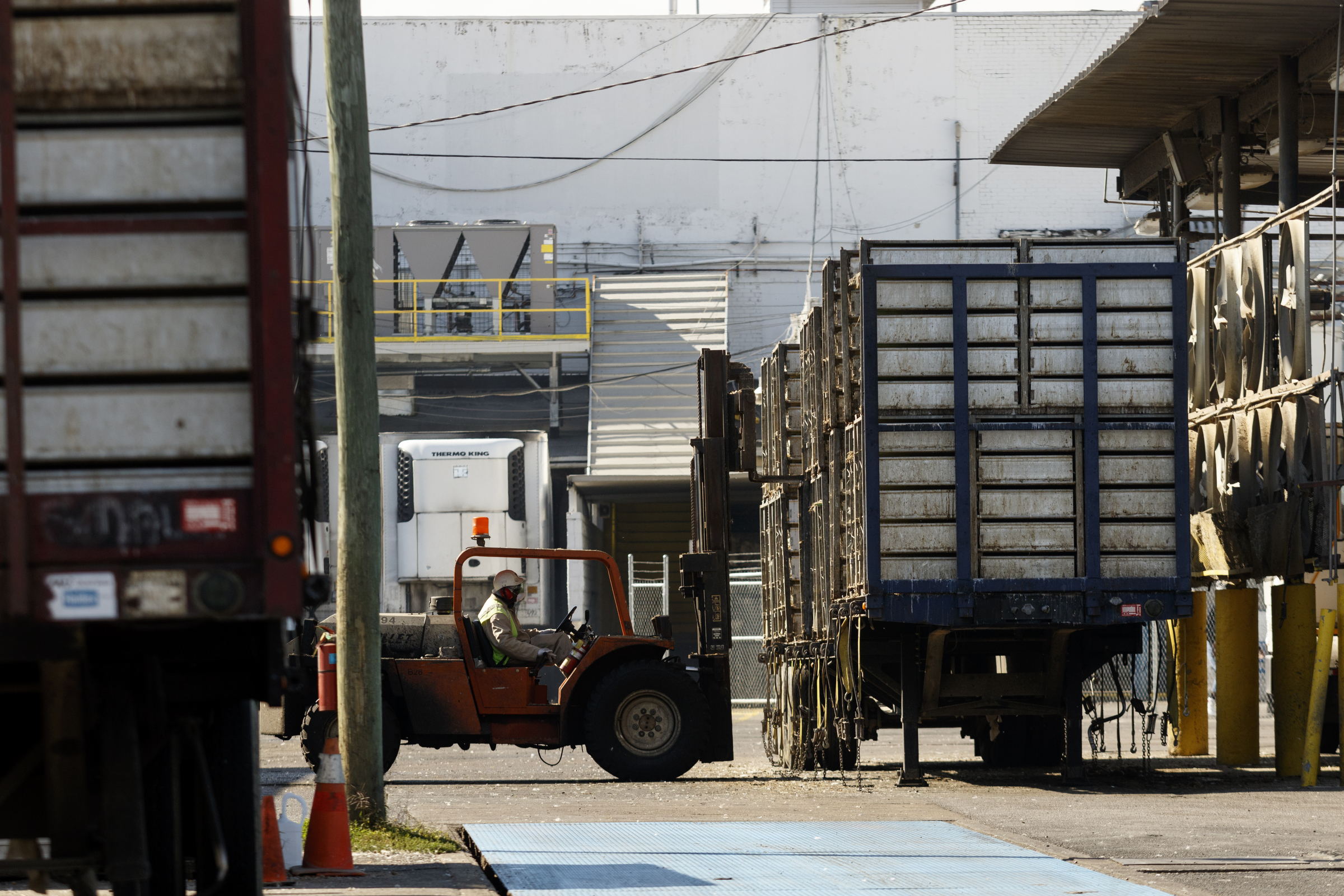 Downtown on Main Street, Blackwell Smith, right, longtime resident and business owner in Walker County, speaks about not wanting a Pilgrims Pride chicken plant in McLemore Cove Thursday outside the 1591 Broad Street plant in Chattanooga. Lizzie Caldwell, left, stands with the protest of the plant. Smith represents the McLemore Cove Preservation Society.
Downtown on Main Street, Blackwell Smith, right, longtime resident and business owner in Walker County, speaks about not wanting a Pilgrims Pride chicken plant in McLemore Cove Thursday outside the 1591 Broad Street plant in Chattanooga. Lizzie Caldwell, left, stands with the protest of the plant. Smith represents the McLemore Cove Preservation Society.Amid concerns over the possibility of a Chattanooga chicken plant relocating to North Georgia, the Dade County Commission has put a temporary halt on permit applications for development.
During a meeting last week, a resolution was passed after Dade County residents were told Monday that real estate developer John Wise was considering helping facilitate the move of Pilgrim's Pride from downtown Chattanooga to a 300-acre farm he purchased a few months ago in Dade County.
On Friday, Wise told the Times Free Press he has no plans right now to develop anything on the property. He said he wants to keep it as a "gentleman's farm" and provide quail hunts.
Wise owns several apartment complexes in the area near the current chicken plants. As that area has been developed and populated, more people have complained about the smell and other issues that come with having such large animal processing facilities in an all-of-a-sudden booming residential area.
"I knew what I was getting into there," Wise said, adding that he wouldn't have the properties if he had worries about being so close to them.
This spring, Chattanooga City Council Chairman Ken Smith introduced an ordinance amending the city code for health nuisances by adding a section that addresses "noxious odors," something that could directly affect the city's chicken plants.
But while the amendment was spurred by a "tremendous" number of calls complaining about the stench, Smith said, the intent is not to target Pilgrim's Pride. It was meant to address all businesses that have problems containing odors, he said.
In July, Knoxville-based developer John Murphy said he didn't expect his 158-unit Southside apartment building at Broad and West 17th streets to be neighbors to the chicken plant forever.
He said he's excited about the complex, called 17 Broad, even as a lot of apartment units have opened. While Murphy said he doesn't expect the chicken plant always to be located next door, he believes the odor is less than it was three years ago when the apartment project was conceived.
"It was a foul smell," he said. "It has improved tremendously. I think they're trying to be a good neighbor."
Talk of the chicken plant moving to Dade County comes just a year after Walker County residents fought the chicken plant moving to their backyard.
In May 2018, residents of Walker's Kensington community accused Walker County government officials of secretly "conspiring to install a large-scale chicken slaughterhouse" in their area.
The McLemore Cove Preservation Society, a nonprofit in the rural region where Lookout and Pigeon mountains meet, filed a complaint for injunction in Walker County Superior Court. The group asked a judge to block the county and Pilgrim's Pride from opening a plant in the area.
Weeks later, the group dropped its lawsuit out of fear of a possible counter-suit.
Now, Dade County residents are worried about their livelihood as concerns are surfacing.
What's happening in Dade?
William Back, executive director of the Dade County Industrial Development Authority, told the Times Free Press on Friday that Wise said he is "considering a number of options for the property" that include both agriculture and industrial applications.
 Blackwell Smith, longtime resident and business owner in Walker County, does not want a Pilgrims Pride chicken plant in built McLemore Cove. Smith and others made their thoughts known along West Main Street Thursday across from the Broad Street plant in downtown Chattanooga. Danae Sweeton, right, was there "for the animals of the cove," she said.
Blackwell Smith, longtime resident and business owner in Walker County, does not want a Pilgrims Pride chicken plant in built McLemore Cove. Smith and others made their thoughts known along West Main Street Thursday across from the Broad Street plant in downtown Chattanooga. Danae Sweeton, right, was there "for the animals of the cove," she said."Of course he is a real estate guy, not a chicken guy," Back said. "If he does do anything, it would be a real estate deal, and the [authority] has no role if it's a real estate deal, unless we're invited in."
Back said no proposal from Wise is on the table through the authority. However, the former owner of the property, Leonard Nixon, was in the process of certifying the property for industrial development before he died in September.
The Georgia Ready for Accelerated Development certification, or GRAD, is a big deal, Back said. It's a process that takes a long time and a lot of money to finish.
Wise said he didn't know anything about Nixon's certification application.
Around the time Nixon applied for the GRAD certification and when Walker County was fighting off the chicken plant, Wildwood, Georgia, resident Katie Bien started the Wildwood Preservation Alliance.
Bien's great-grandfather was Dave L. Brown, owner of the family farm that was famous in the community. The land has been passed down to her family for generations. Her great uncle was Leonard Nixon.
Bien started the alliance to help prevent big industry - especially animal slaughterhouses - from moving into Wildwood, saying they would pollute air quality, poison nearby creeks and destroy the quality of life for residents.
Bien understands that no one can tell anyone what to do with their property, but Wildwood has operated on mutual respect when it comes to land development, and "you can only rely on that for so long."
She has heard discussion that the proposed chicken plant would include combining the two Chattanooga plants and bringing in an estimated 9,000 people to the bedroom community of 2,000 people.
She said that obviously would create not only an environmental crisis but an economic one.
"We'd have to build another school," she said. "We don't have the roads for it, we don't have the infrastructure to handle it. We don't have the resources to go from 2,000 people to 11,000 overnight."
Bien said she'd much rather see Wildwood spur economic growth through preserving its natural resources and look to tourism.
What did the commissioners do?
The Dade County Commission, with a push from the public, passed the resolution that put a moratorium on permit applications, but not without some insight from Wise.
Dade County Commissioner Lamar Lowery said some of the commissioners met with Wise earlier this week and discussed how to create regulations for industries in unincorporated parts of the county. He did not give specific examples of any possible regulations.
Lowery also said that Wise "assured" the commissioners that "for right now, he had no plans to build a chicken processing plant" in Dade County, but he didn't go as far as saying he wouldn't build the plant.
Lowery said he has heard from several people in the community about how detrimental the facility would be to the community.
"They're scared to death," he said. "It could change everything. It would change our school system, they're worried about obnoxious odors, water pollution, people could lose value in their homes. If something comes in like that it could hurt a lot of people."
Lowery said Wise gave them advice on how to start the process of setting some rules and advised the commissioners that the county could be at risk with bad development deals in the future if nothing was done.
"If there aren't any rules [on the books] then we don't have a leg to stand on," Lowery said. "As county commissioners, public safety is our number one goal. We appreciated his advice, and we're following it."
Dade County Executive Chairman Ted Rumley said the resolution was passed so the commission can take a closer look at how heavy industry can develop in the county.
"We're not trying to tell what a man can or cannot do with his own property," he said. "Right now, we have no zoning whatsoever. This would give us the right to look at some plans and be able to comment and say aye or nay to something like a chemical plant."
Bien said the resolution is not in response to one developer but was created because Dade County officials realized how vulnerable the county was to drastic changes and potentially devastating effects.
Rumley said that with so much development on the outskirts of cities today, Dade County and similar areas "are what people are looking for."
He said what he heard from Wise was that the real estate developer was "definitely not" going to move the chicken processing plant to Dade County and instead use his land as a quail-hunting refuge.
What happens next?
Bien and the alliance will continue to work with officials in Dade County to hopefully protect land from being developed for heavy industry.
It is well-known in Dade County, Bien said, that zoning ordinances are frowned upon, but commissioners will continue to look at possibilities going forward.
Wise said that when he bought the property, it came with no stipulations as to what he could do with it. While he said he doesn't have plans to move the chicken plant to Wildwood, he did say that facilities such as chicken plants are built to a certain standard today that ensures they don't emit odors or create environmental issues.
"I don't think people are up to speed on modern technology," Wise said. "The one here [in Chattanooga] is a little older. If one were built today it would have to be built to modern standards."
Contact Patrick Filbin at pfilbin@timesfreepress.com or 423-757-6476.

